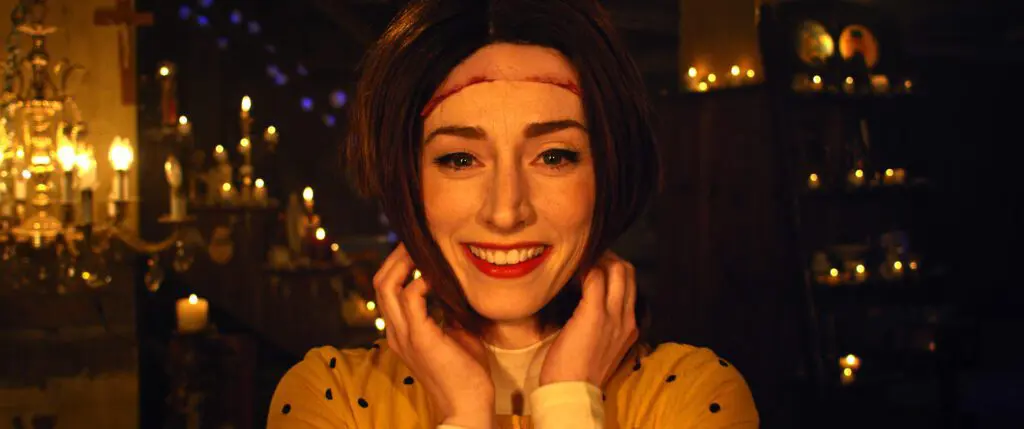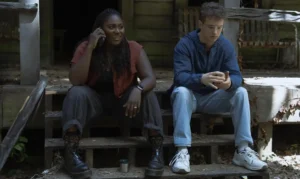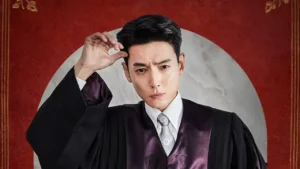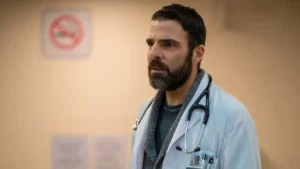This article contains mild spoilers for The Stylist.
There has been such a buzz about The Stylist: everyone who’s seen it wants all their friends to see it too. It’s a fascinating and exciting film, so I was chuffed when the filmmaker behind it agreed to talk to me; besides, interviews like this are my sneaky way of finding people to talk to with common film interests.
After brief introductions and inevitable small talk about the strange times we live in, I decided to start with a cheeky question. Knowing that Jill’s background is in hairdressing, I asked whether The Stylist was based on a true story. “Well, I definitely joked that we should add at the start of the film ‘based on a true story’ because there was a period in horror when it appeared on so many films. So can you add that in if just a tiny part is based on truth? Me being a hairstylist is true, but no, I do not want or have ever scalped anybody. Almost seven years ago, the thought just came to me: how is there not already a hairstylist horror movie? That came from Robert Rodriguez’s teaching on indie filmmaking: he really preaches the idea that when you’re starting out and you don’t have millions of dollars lying around, you just look at what you have access to that’s unique. That’s anything from locations to props to specific wardrobe; anything that you can write around and build an idea. Partly that, the knowledge I have, access to salons as locations, and the realisation that this is not already a thing: so I decided I’m going to do it! I grew up a huge horror fan, I’m doing hair in this salon: this will be like everything that I am and love all at once.”
That brought me neatly to my next question: why do you think hair is so important? “Actually I admire someone like you who has removed your hair [mine is clipped right down] which I’ve always wanted to do, though I’ve shaved half my hair before now. I can imagine it being therapeutic and I’ve wondered what it would be like, but scared that the next day I’d regret it, and I know how long it takes to grow.” (I shared some of my experience, but that’s not the topic of this piece.) “It’s weird: it’s something we hide behind sometimes. We put so much into this essentially dead stuff growing from us, which had a practical purpose, but now it has an aesthetic, like a part of our wardrobe. That’s a really good question, and I feel like I should know the answer, because it’s been my whole life.”
Back to the film. I asked Jill what influenced The Stylist, apart from the trappings of her world that she mentioned previously. “This goes back to my love of The Texas Chainsaw Massacre, my favorite horror film of all time. Back when I first envisioned Claire, I saw her as a hairstylist version of him. I saw her in her lair (or whatever you would call it), where the souvenirs from her previous victims were displayed like hunting trophies, and I imagined her wearing one and being lost in it along with the personality of whoever it belonged to. That’s kind of how I interpret Leatherface: in the original, at least, he behaves differently according to what mask he’s wearing, he changes his wardrobe to go with the mask. He’s even further removed from reality: we never see him as him, but only with a mask. That actually got me thinking about an interesting difference: Claire isn’t always under a “mask”, but if she was… Anyway it started like that, and I realise not everyone feels this way about Leatherface, but what I love about the original film is it was the first to give us a little bit of the villain’s side of the story. We got to know the family, better than any of the iconic slashers which are presented in a one-dimensional way, intentionally a lot of the time. Leatherface is like the child of the family, maybe raised this way and never been in society: so to him, this is just life. So that was one starting point, but also I have a love for anti-hero stories: they’re complicated characters who are often doing what’s maybe not right, but we get to know a whole story. I’m not suggesting that killing people can be “right”, but it’s definitely not that simple, especially from that individual’s point of view. In real life, it’s easy to look at a story about something horrible someone did and say they should be gone or sent away forever, and there’s a real issue with looking at the root of the problem behind that story and addressing these things. I’ve gone on a rant there!”
But that was an interesting perspective: if I’d read about Claire in a newspaper, there would be no context, it would just be an interesting crime. I’d have no opportunity to sympathize or get any proper look at her. “I realize it’s a dark perspective, but there was a piece in the news recently that really made me think about what I wanted to say. There was a woman on death row who they actually ended up executing. She had done something absolutely horrific that no-one would try justifying by any means. She had come from a beyond horrible background with a lifetime of abuse, and the system had known about this and could have done something when she was a teenager, but they left her in this situation. So there was this perspective that after all these years, when she’d done something horrific… now you want to take an interest: you abandoned her when she needed help as a child, but now she has grown up and needs to be punished. The same system that could have helped back then executes her now: that’s beyond tragic to me.”
The topic of sympathising with The Stylist’s protagonist was an interesting one, because it seemed to me that this is easier if you understand her. The reasons behind Claire being an unbalanced person were left open to interpretation; or had I missed something? “Yeah, we did want to leave it open so people could connect to her or insert ideas where they wanted. We experimented with telling her complete back story when writing the film, even against our wishes – I never wanted to, but thought it was worth at least seeing what it looked like – and I just like films that you can think about and there are a lot of different interpretations, rather than being told ‘this is what it is’. We did try to hint at it with things in her house, her conversations with Olivia (Brea Grant’s character), but never wanted to spell anything out. I knew it would be a fifty-fifty thing: some people want to be told exactly what’s going on and some are happy with that.”
The way I saw it, if we were watching Claire’s story play out in real life, she doesn’t actually understand herself any more than we do as an audience. Having an explanation would be artificial. Jill was content with that. “That’s definitely part of it: it’s always been about someone who’s battling with her identity. There’s also never any real explanation, step-by-step, of why something like this does end up happening. There are always hints in people’s backgrounds, but none of that means you’re going to become a killer or whatever. It’s hard to explain, even if you wanted to.”
The Stylist was based on Jill’s short film of the same name, which had been a hit on the festival circuit a couple of years ago. I was curious to find out about how one progressed into the other: was the short originally intended as a stand-alone piece, or a proof of concept for a feature film? “It was kind of a mix because when the concept first came to me I wanted it to be a feature-length film, but I knew that there was no way I was ready at that time to make a feature. So my thought process was why don’t we make the short film, and then we can start writing a feature version so that script is ready for when the short comes out. That was the idea, but I didn’t have the script ready when the short came out. The concept worked well enough on its own to make a good short: I’ve made some concepts that we don’t share publicly, but this one seemed like something that could do well, and if it did, that could help us maybe pitch the feature down the line. We didn’t know what would happen when the short came out: it was a wild dream come true, which is why I kicked myself for not having the bigger script ready at that time. We had people asking us straight: is there a feature? And these were exciting companies, but I had to say yeah there is one, but it’s not ready yet. That’s one of my biggest pieces of advice for other filmmakers: try to package it all and have it ready when the short is premiered. They say ‘be prepared for success’, but I think that means to be prepared for the most amazing opportunity happening: if you’re not ready, you have to pass it up. It turned out to be helpful that we were writing the feature while we were taking feedback on the short because it also influenced how we approached the feature: what people mostly clung onto from the short kind of swayed us. People seemed to focus on physical appearance, which is a theme in this world and industry (the want for perfection and whatever that means); so we realized we needed to strengthen how the film is about what’s going on internally, and how we perceive ourselves versus how we actually look. For example, there was scarring on her neck in the short, but we removed that from the feature, because it made the subject kind of shallow: it wasn’t about her external appearance.”
A good deal of the filmmaking team was carried forward from short to feature: such as writers, cinematographer, composer, production designer, editor. “We tried to bring back as many people as we could: they had done a great job, but also it’s like a family to me, a loyalty thing. If there’s an opportunity that came from the short they worked on, I wanted to give that back to the same people. Also, these people had been invested in the character, marinating on her for five years or so, so when it came time, they were ready. It was so exciting to work with Nicholas Elert on the score, but seeing him work on something bigger than twelve minutes was such an undertaking, but such a cool experience. We’ve got so many compliments about the score it would be great to release it in some way. Working with him is so cool because he’s like some sort of musical genius: musicians amaze me because I don’t understand how this stuff comes out of them. With him, we’d go through the film and discuss how we wanted it to feel, because the whole film is intended to bring you into Claire’s perspective, and the camera, music, everything brings you into her world. Normally in a horror film we would try to make you scared, but in this one we’re trying to get you into the killer’s side. It was really interesting, because there are some scenes where she’s stalking people for example: we don’t want to present what it feels like to be stalked, but instead what is it like to hunt. We talked about a hunting sound, and the emotions to go with it, and I have no idea how he turns that into music.”
In my opinion, the music combined with other elements (such as lighting and cinematography) to make it a very sensory film, especially when Claire was doing her hairdressing work: I could imagine the feel of fingers on my head and so on. “We were trying to go for that sort of ASMR feel,” said Jill. “We talked to our sound people about textures and hairbrushes and so on, so I’m glad that worked.”
I could see through my Zoom portal into Jill’s room a table behind her with wigs and heads, and so asked were they used in the film? “Yes, in fact, one of them is the one that she scalps in the short film, and we made sure to put it in as a prop in the feature. It would be cool if anyone notices things that are brought over.”
After that brief distraction, I went back to The Stylist again, this time asking about the character of Olivia. I had found her very interesting, because she was difficult to read at times, so it was easy to sympathize with Claire’s misreading of the social cues: was she trying to be a friend, simply a client or what? So I asked Jill whether Olivia was based on a real person. “She’s actually based on one of my best friends; not the aspect of being hard to read though, but I am excited to hear you say that. I’d hoped that the camera would present people more the way Claire sees them, even though it’s not literally shooting her POV. It should almost be delusional: this is Claire’s off reality way of perceiving things. From Olivia’s perspective, I wanted her to be a full character played as a genuine person even though the camera shows different: that was a weird line to walk. For me, it was always that Olivia was a kind, warm person just getting ready for her wedding, so there’s no deep thing that she’s instigating, no budding best friendship. But for Claire, she’s been such a lonely person that it feels like a huge thing that someone takes an interest in her like this. So they’re perceiving what’s going on in opposite ways, and when Olivia starts to see that and attempts to lay out some boundaries, Claire gets this like the end of the world, like Olivia must hate her now. Watching that scene is heartbreaking, but I also know that Olivia isn’t being mean, but just reasonable within that situation.”
Those boundaries were raised kind of abruptly, from what I saw, but I did understand that abruptness: Olivia had a lot going on, and was trying to focus on her wedding preparation. I also understood how that abruptness could feel to Claire though, struggling as I do with social nuances myself sometimes: kudos for creating a scene that autistic me could relate to.
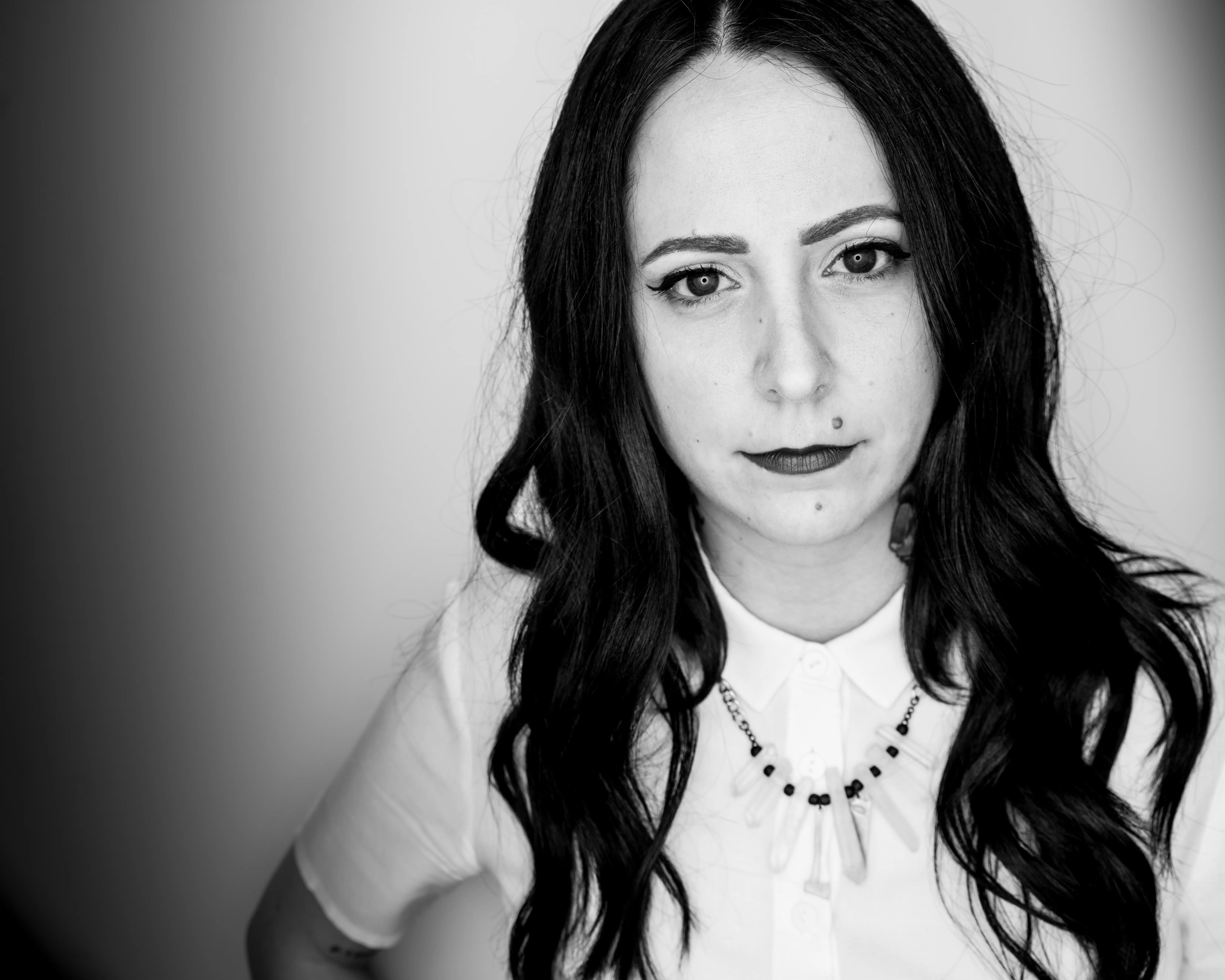
So having talked plenty about The Stylist and each of our interests in it, I turned the conversation to Jill herself a little, starting with her other name, Jill Sixx. “Well, six was my favorite number as a kid. When I was nine or something I picked the number for my practice jersey, but the guy said ‘that’s not a very lucky number’, which stuck in my head, but I didn’t know the relation to the Devil or anything like that. I just had some connection to the number at first, but it got a bit deeper over time, for silly reasons: once I realized the 666 connection I liked that it bothered people, and I became a big fan of Mötley Crüe in high school, read a book about them and found out about Nikki Sixx, and it just all kept going. I named my company after that, and my name is something I always have to deal with: people ask ‘what do you want to go by?’. I do love my real name, and as a filmmaker, I do want to use it, but Sixx is easier to say than my real name.” She demonstrated how to pronounce Gevargizian and smiled when I (more or less) said it right. “People look at it and wonder how on Earth they’re going to introduce me.”
My next-door neighbor is changing careers from being a music teacher to a policeman. I asked Jill how did she move from hairdresser to filmmaker. “I’m still a hairdresser, somehow doing both all the time. I started going to horror conventions late in life; I can’t believe I didn’t start when I was in high school, I would have completely geeked out. I still completely geek out when I go as an adult, having started going to horror conventions when I was nearly thirty and discovered this whole world, a community of connected fans. I was like this is exciting as Hell! At that first convention, I watched some independent films, and the filmmakers were there; the whole weekend changed my life. I didn’t know anything about independent films and had no filmmakers in my life until that event. I came back home and started a monthly screening series for independent horror, and I had to seek out the filmmakers in order to show their films. Through that, I became inspired that real people like you and me can make movies: it’s not just reserved for the filthy rich or those who are already connected in Hollywood. I was especially inspired when I saw short films because you can make something really high quality at a smaller scale because indie features are harder to make look good because of having to stretch the budget and everything out. I got more inspired as I also became more connected with the horror community here in Kansas City. I met a writer named Eric Havens, and they had a script named Call Girl, and after a while working on that together, I asked if I could direct it, not even knowing what I was saying at the time. I think that’s what a lot of this is about: if you want to try doing something, you just have to start doing it. We jumped in with that film, and Eric helped develop The Stylist short film and the feature script. I made other shorts in between too, but basically when I found ‘it’, I wished I’d found it earlier in my life. But I’m so excited now: I did a lot of creative things when I was younger, but film is the ultimate. You get to work with all these different aspects from music to photography and design: once I found that world, I fell in love with it.”
And now, The Stylist is going to be released via Arrow on 1 March. “It’s so exciting! It’s crazy because I have so much to do while being excited at the same time because this really is a dream come true. Before our call, I was looking at the list of things I need to deliver by the end of this week. But it really is surreal. I don’t know what it’s going to be like on March 1st when anyone can watch it. The festival experience has been so exciting, thanks to social media, as we can’t be together this year: we watch reactions on Twitter and so on, and I hardly know how to describe it. Me and the team are like ‘we did it!’”
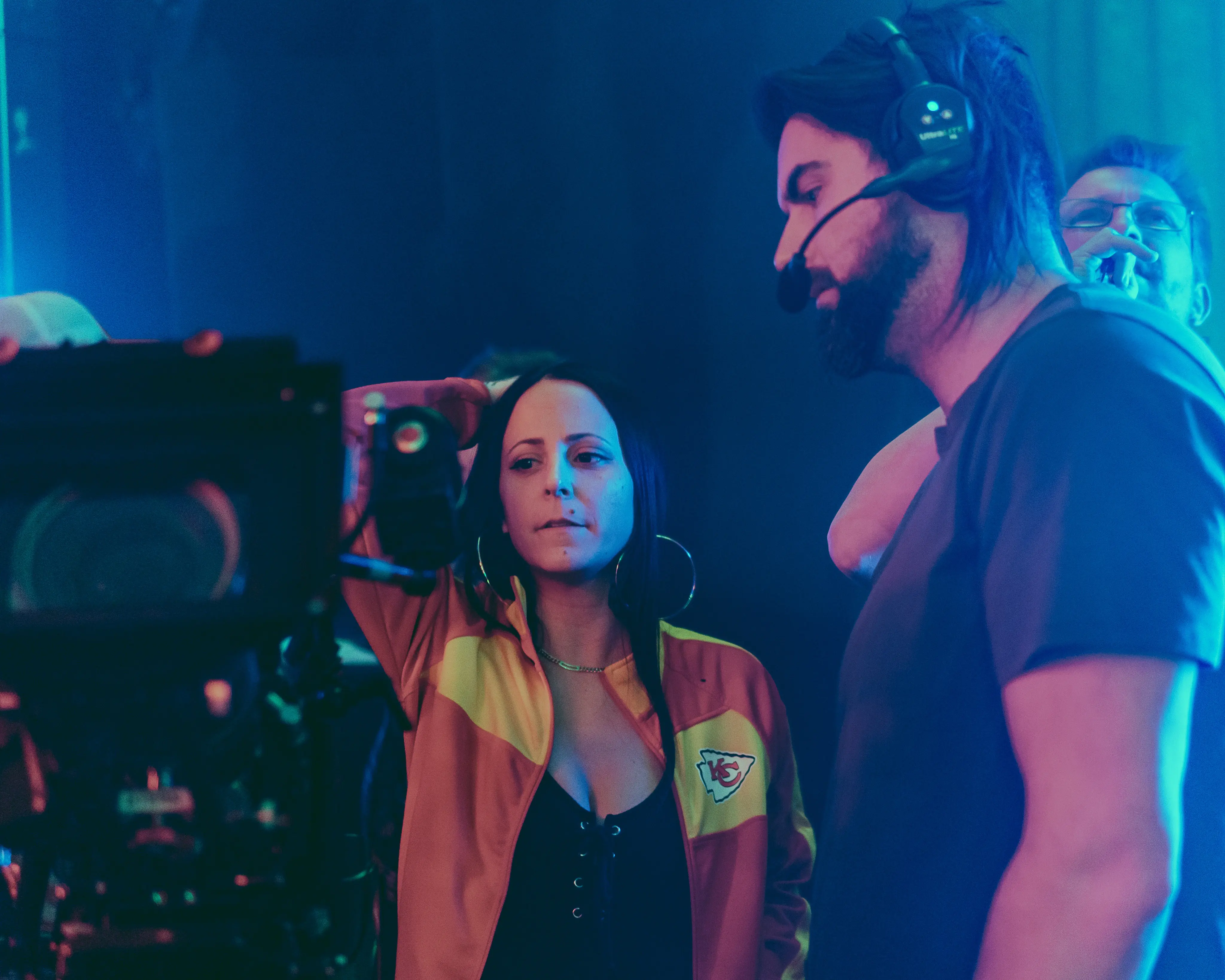
Her mention of social media prompted me to bring the conversation to the changes across the world this last year or so. I’ve found a silver lining in the pandemic in that I’m conducting interviews remotely like this which would never have happened in the past; they only happened this way because they had to. I asked whether there was a silver lining for Jill too. “Of course we all wish we could be literally at festivals again. Personally, it’s a special experience being in the room and hearing the reactions in real-time to specific moments of a movie. But honestly, the silver lining is our technology: even if a film is geo-locked, a whole country can access a festival now, not just the number that fits in a venue. Here in the States, we premiered at Fantastic Fest and anyone in the country could get a ticket, as opposed to just those in Austin. So it’s been accessible to so many people. Not just festivals, but other events have gone that way too: The American Cinematique, who owns the Egyptian Theatre in LA; they’ve been hosting Q&As every week and they’re all free. It’s cool to see people attempting to adapt like this, and I’ve been focusing on the positive. Looking at what we can’t do is a waste of time. I feel lucky that we had the film through this whole thing: we worked on post-production all through this, having started editing the film in March last year, just before everything shut down. So I was kind of starting to prepare for not releasing the film in person, so as not to be let down farther down the line. But people can definitely access films more than ever before and in creative ways. I’ve seen festivals set up online like virtual parties where you can walk around: it’s amazing!”
Another inevitable question now: what’s next? “There are a few different things I’m working on. I’m helping to produce my friend John Pata’s next film; he’s actually how I met most of the team on The Stylist. We’re like a tight little family that likes to help get each other’s stuff made, and I do like to produce other people’s work as well as directing my own stuff. I’m into finding what we need to get things done and then getting it done! But I have a couple of projects I’m attached to as director that I’m excited about, but I don’t think I can talk about them much in detail though. They’re both in the thriller/horror world and one is with the writers of Fangoria’s Porno, a crazy horror-comedy. There’s kind of a game that we’ve all got films in that state, but can’t really talk about them because who knows what’s going to happen and what isn’t. It was hard before COVID and now even harder. Where can we shoot? When? I don’t know how eager people are to finance films because there’s so much uncertainty in the air right now.”
We talked a little about the range of different perspectives I’ve come across through these interviews. Jill commented “I think it’s important that we figure out how to adapt to this because there’s a lot of waiting for it to go back to normal, but I think that’s kind of a fantasy. It’s not going to happen with a flick of a switch. I know it’s challenging, but we need to continue doing what we do the best we can because we’re all sitting at home and still need the arts and entertainment. I have friends who are musicians, and a big part of the experience for them, when they’ve finished something is to perform it in front of people. Perhaps it’s not quite as connected as live music, but playing a film in a live theatre is similar. Then there’s sports and other activities with an audience reaction, which we’ve all taken for granted, not grasping how important that was. We need to hear new stuff more than ever, so we have to find a way to adapt, hard as it is.”
Before closing, we lightened the tone a little with talk about how The Stylist’s Claire finds ways to adapt: hopefully, those of us in the real world can try a healthier approach. Still laughing a little, I asked whether I could try being someone else with the help of a wig: “I love your hairstyle as it is. I’m still cutting hair now, and so many people are coming in to get it cut off. I tell them it’s freezing outside! Wasn’t this the wrong week to do it? I do wonder though about wigs how people manage to wear them all day: surely it’s hot and uncomfortable. You can borrow one of these with the skin still on, and be Claire for Halloween or something!”
Maybe one day when we can all travel again, I’ll meet Jill with clipped hair and she’ll see me in a wig. I look forward to finding out what films she makes and promotes next.

